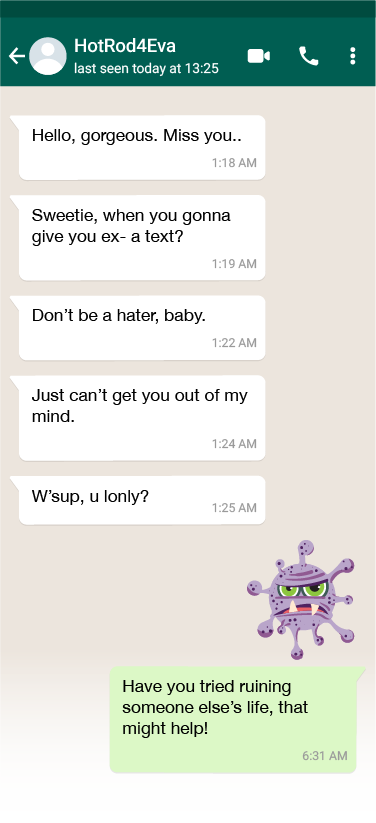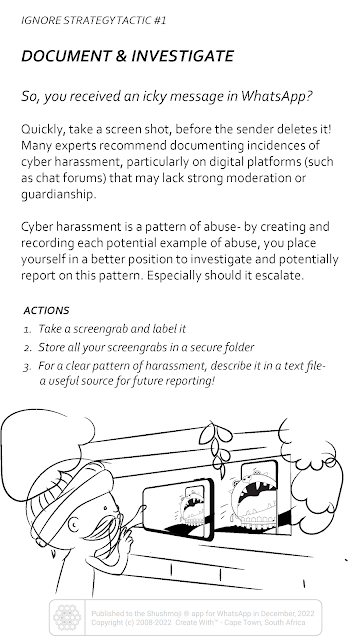Saturday, 15 April 2023
Use the Shushmoji app to learn anti chat harassment tactics and end anti-social conversations with WhatsApp chat stickers
Written for people wanting to learn strategies for ending chat harassment in WhatsApp and use chat stickers for this.
Apple users can now feed their trolls with Shushmoji chat stickers in WhatsApp using the free Shushmoji app at https://apps.apple.com/us/app/shushmoji/id1639680705. The app works on Mac, iPhone, iPad and iPods with an M1 chip (or later) and running Mac OS.11 (or later).
The Shushmoji app's sticker packs cover garden-variety trolls, academic bullies, silly asses, pesky sinners and torturous types. Check out two examples of their use below {or there's five here, thirty examples here or via Pinterest !} Download the app to use its free set with 30 stickers; premium sets are available for in-app purchase.
Create With Cape Town's Shushmoji app is also available for Android users at https://play.google.com/store/apps/details?id=com.createwith.shushmoji&hl=en&gl=US. It's compatible with Android phones and tablets.
| Stop silly troll! chat sticker example | Stop sinner! chat sticker example | |
|---|---|---|
 |  |
The Shushmoji app also offers twenty anti-chat harassment tactics cards. These fall under four strategies for stopping trolls: ignore, report, respond and prevent. Install the app to scroll through all twenty cards on your phone or tablet.
| Ignore strategy index card | Ignore tactic card |
|---|---|
Why develop a Shushmoji app?
In the first place, there are few end-of-conversation chat sticker designs. Secondly, there also seemed a need for an anti-chat harassment cyber toolkit that targets of cyberbullying could quickly access for tactics. Hopefully knowledge of these can helps expand cyberbullying recipients' understanding of what else is possible than simply being silent and enduring harassment!
Being silent echoes the conventional advice, Do Not Feed the Trolls (DNFTT). It reflects how there are many downsides to communicating with harassers, since they are likely to be mentally unstable (Barnes, 2018). Online trolls score low in the Big Five Personality scores of agreeability and conscientiousness, but score high in Dark Tetrad traits of- narcissism, Machiavellianism, sub-clinical psychopathy and/or everyday sadism. Attempting rational engagement with perpetrators of cyber harassment is likely to provoke retaliatory attacks in excess of the original abuse. This may be further escalated via circling cyber vultures and mobs. Such amplification is common to unmoderated platforms where destructive, hostile and bigoted behaviour is rewarded with likes and re-shares.
While the responsibility for harassment should lie with its perpetrators, society often blames the victims for “putting themselves out there” (Citron, 2014). This reflects a slow-changing social reality in which support for targets of cyber harassment grows at a glacial pace; whether in institutional and organisational culture and policies, or in law and its enforcement. Individuals who fight back against cyber harassment must take a risky gamble in weighing up this battle's pros and cons. For many, the potential benefits of nudging discussion towards norms of respect, whilst repairing any reputational damage, seem unlikely to outweigh the severe downsides of escalating cyber-harassment.
Create With Cape Town's end-of-conversation stickers were designed to support targets' ability to disengage from cyberbullies. Unlike the DNFTT tactic, it does not mute their voice and right-of-reply.
These chat stickers can help end chats-gone-bad, whilst showing trolls and their audiences what one thinks of their behaviour.
Create With Cape Town's end-of-conversation stickers were designed to support targets' ability to disengage from cyberbullies. Unlike the DNFTT tactic, it does not mute their voice and right-of-reply.
These chat stickers can help end chats-gone-bad, whilst showing trolls and their audiences what one thinks of their behaviour.
Support using the Shushmoji app
Shushmoji app credits
Two intern teams from Younglings Africa coded the Shushmoji app in 2020 and 2021: Led by Russel Magaya, 2020’s Android development team comprised Diego Mizero, Shane Abrahams, Ethan Jansen and Johan van der Merwe.
In 2021 the development team focused on Apple and Android versions. It was led by Joshua Schell with Lindani Masinga and consisted of Zaakirah Abrams, Arthur Butler, Rayaan Karlie and Zainab Hartley.
Younglings Developer Solutions' Michael Pretorius completed the Android development in 2022 and the Apple roll-out in early 2023.
Shushmoji feedback
We trust you enjoy using the Shushmoji app. Any comments, concerns or suggestions on the #Shushmoji app, can be shared with me via Create with Cape Town’s email form at https://www.createwith.net/contact/. Do be patient for a reply- it may take one full working week for non-urgent correspondence.
Alternately, hashtag #Shushmoji and #CreateWithCapeTown and give a shout-out to our Facebook, Instagram, LinkedIn or Twitter accounts. Cheers!
Alternately, hashtag #Shushmoji and #CreateWithCapeTown and give a shout-out to our Facebook, Instagram, LinkedIn or Twitter accounts. Cheers!
Labels:
app
,
apple
,
CHAT
,
cyberbullying
,
emoji
,
harassment
,
prevention
,
stickers
,
toolkit
,
trolls
,
WhatsApp
Location: Cape Town, Western Cape Province, RSA
Cape Town, South Africa
Subscribe to:
Posts
(
Atom
)









 orcid.org/0000-0001-9566-8983
orcid.org/0000-0001-9566-8983